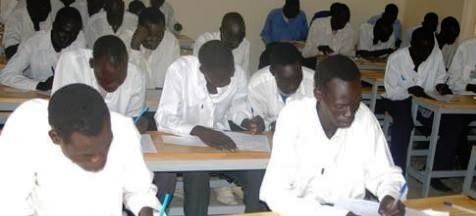About 34,536 students today started sitting for the South Sudan Certificate of Secondary Education (SSCSE) final examinations across the country.
The government says the number of students sitting this year is higher than the number that sat last year and comprises 11,716 female and 22,820 male candidates.
The examinations which will run for 10 days were officially launched by President Salva Kiir at Juba Day Secondary School in Juba by ringing a bell.
Speaking to journalists during the ceremony, President Kiir encouraged students across the country not to panic but to make use of what they had learned.
“Am very excited to be with you this morning to ring the bell that symbolizes the start of examinations and also wish you the candidates who are sitting for this important examination the very best of luck. So, my children, there is nothing to fear about,” President Kiir said. “It is always understood that when such a time comes, some of you will start to tremble. But it is not new, it has been on throughout. I want to tell you to keep your courage and you apply all that has been taught to you.”
He added that it was a chance for him to also commend the teachers across the country for their tireless work and for preparing the students for the examinations amidst the Covid-19 pandemic.
In a statement to the media, the Minister of General Education and Instruction, Awut Deng Achuil said, the examinations are being carried out across the country including areas under the control of the opposition.
“I don’t think this is the time to discuss that, it is already past. We have explained and we thank the First Vice President (Riek Machar) because what we wanted was access to the security of examinations and the personnel and that is all. It has already been done, their examinations have already been delivered,” Awut told reporters.
South Sudan Certificate for Secondary Education was technically set from South Sudan and printed in London to avoid any leakage.
A few weeks ago, social media was awash with allegedly leaked examination papers, especially physics, biology, and chemistry, but the minister for general education refuted the allegations saying the examination papers were printed in London to prevent leakages.
Speaking to the press during the ‘ringing of the bell in Juba’, UNICEF’s new country representative, Hamida Lasseko, applauded the government of South Sudan for keeping schools open.
“This is a great moment for the children of South Sudan. This shows the commitment of the government of South Sudan towards education and as you could hear from the president that education is the most important thing for this country,” Lasseko said. “I am very pleased to see that the ministry of education has the support of the high level of the government to let the children do exams and also the reopening of schools in a safe manner considering that they take precautions of the Covid-19.”




